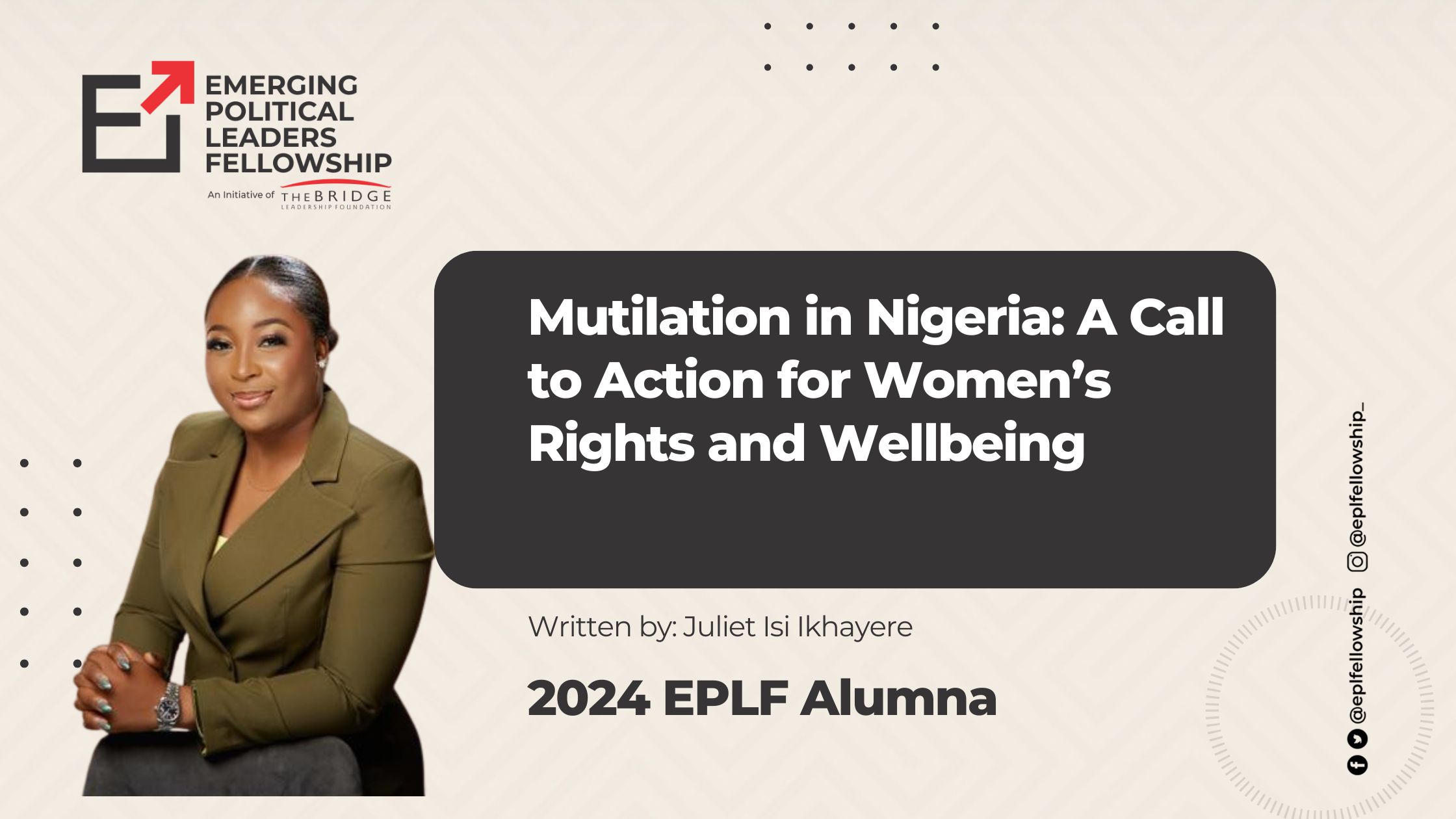An Article written by Juliet Isi Ikhayere-Asekomeh, a 2024 EPLF Alumna
Female Genital Mutilation (FGM) remains a deeply entrenched practice in Nigeria, with devastating health implications and a blatant violation of women’s sexual and reproductive rights. Despite global and local efforts to eradicate this harmful tradition, the generational continuation of FGM persists, with recent studies revealing a 40% continuation rate among mutilated women who have daughters. This alarming statistic underscores the urgent need for sustained advocacy, education, and policy interventions to break the cycle of this harmful course.
As a dedicated lawyer and young politician in Nigeria, I have consistently championed the cause of women’s rights and the elimination of social and economic barriers that hinder their progress and my commitment to ending FGM and other harmful practices against women in Africa is unwavering. As an ardent social researcher, I have come to find out that Female genital mutilation is not just a health issue but a social convention deeply rooted in cultural norms and beliefs.
The persistence of FGM in Nigeria can be attributed to several factors, including the influence of social norms and the personal experiences of women who have undergone the practice. Many women who have experienced FGM may not perceive it as humiliating, especially if it was performed by trained medical personnel. In some conservative communities, mothers even justify the practice by claiming it helped them remain virgins before marriage, thereby promoting marital fidelity and premarital fertility. These beliefs, though deeply flawed, highlight the complex social dynamics that perpetuate FGM.
However, the physical, psychological, and emotional toll of FGM on women and girls cannot be overstated. The practice has no health benefits and is associated with severe complications, including chronic pain, infections, childbirth complications, and psychological trauma. It is a violation of human rights and a barrier to gender equality.
The responsibility of addressing FGM is multifaceted. Here are some possible steps to addressing the committee:
1. Education and Awareness Campaigns: Empowering communities with accurate information about the dangers of FGM and its violation of women’s rights is crucial. By engaging community leaders, religious institutions, and local organizations, we can challenge the social norms that sustain this practice.
2. Legal Reforms and Enforcement: Strengthening existing laws against FGM and ensuring their enforcement is essential. Legal frameworks must be complemented by grassroots advocacy to ensure that laws are not just on paper but are effectively implemented.
3. Support for Survivors: Providing medical, psychological, and economic support to FGM survivors is critical. This includes access to healthcare services, counseling, and economic empowerment programmes to help survivors rebuild their lives.
4. Engaging Men and Boys: Ending FGM requires the involvement of all members of society, including men and boys. By educating them about the harms of FGM and encouraging them to become allies in the fight against it, we can foster a more inclusive movement for change.
5. Whistleblowing: The idea of see something, say something should be encouraged and drafted into our laws. This is to afford persons who report to the relevant agencies, the right protection against discrimination such as mob action.
My vision as a young woman in politics is a Nigeria and indeed, an Africa where women and girls are free from all forms of violence and discrimination. I believe that the wellbeing of young women is integral to the progress of any society. By addressing FGM and other harmful practices, we can create a future where every girl has the opportunity to thrive, free from fear and pain.
The fight against FGM is not just a women’s issue; it is a societal issue that demands collective action. Together, we can break the cycle of generational continuation and ensure that no girl has to endure the physical and emotional scars of FGM.
Juliet Isi Ikhayere Asekomeh’s commitment to this cause is a beacon of hope, and her leadership serves as a reminder that change is possible when we stand united for justice and equality. Let us join hands to end FGM in Nigeria and across Africa, reaffirming our commitment to the rights, dignity, and wellbeing of every woman and girl.

